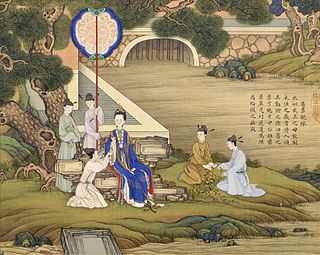 W
WWomen in ancient and imperial China were restricted from participating in various realms of social life, through social stipulations that they remain indoors, whilst outside business should be conducted by men. The strict division of the sexes, apparent in the policy that "men plow, women weave", partitioned male and female histories as early as the Zhou dynasty, with the Rites of Zhou even stipulating that women be educated specifically in "women's rites". Though limited by policies that prevented them from owning property, taking examinations, or holding office, their restriction to a distinctive women's world prompted the development of female-specific occupations, exclusive literary circles, whilst also investing certain women with certain types of political influence inaccessible to men. Women had greater freedom during the Tang dynasty, however, the status of women declined from the Song dynasty onward with the rise of neo-Confucianism.
 W
WThe Four Books for Women was a collection of material intended for use in the education of young Chinese women. In the late Ming and Qing dynasties, it was a standard text read by the daughters of aristocratic families. The four books had circulated separately and were combined by the publishing house Duowen Tang in 1624.
 W
WHongfu, is a legendary Chinese folk heroine from imperial China whose birth name was Zhang Chuchen. She was purported to have lived during the Transition from Sui to Tang and was originally described in Biography of the Dragon-Beard Man from the Tang Dynasty. She was a courtesan in the court of Sui Dynasty minister Yang Su and eloped with Li Jing, an ally and future general of future Tang emperor Li Shimin. Hongfu, along with Li Jing and the "Dragon Beard Man," Qiu Ranke, are known as the "Three Heroes of the Wind and Dust" (風塵三俠). She was one of the few female martial arts masters.
 W
WTai Si was the wife of King Wen of Zhou and is revered as a highly respected woman of ancient China. She was a descendant of Yu the Great - founder of the Xia Dynasty - and was the mother of ten sons, including King Wu of Zhou - founder of the Zhou Dynasty - and his younger brother the Duke of Zhou.
 W
WXi Shi was, according to legends, one of the renowned Four Beauties of ancient China. She was said to have lived during the end of the Spring and Autumn period in Zhuji, the capital of the ancient State of Yue.
 W
WZheng Mao was the primary wife of King Cheng of the State of Chu during the Spring and Autumn period of ancient China. She is one of 125 women whose biographies are included in the Biographies of Exemplary Women, written by Liu Xiang.
 W
WZhuo Wenjun was a Chinese poet of the Western Han dynasty. As a young widow, she eloped with the poet Sima Xiangru. The poem Baitou Yin which complains at the inconstancy of male love, is attributed to her.